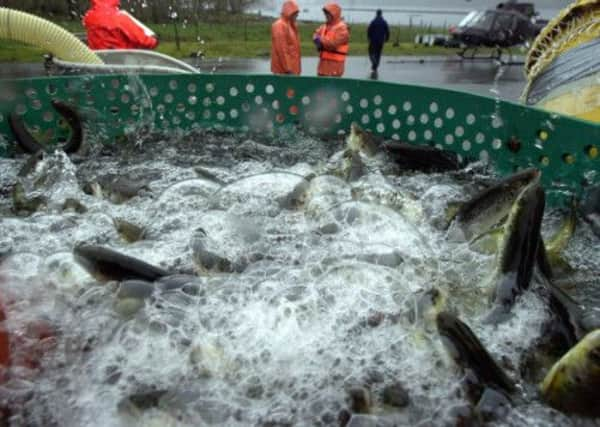Marine Harvest urged to move salmon cages


Marine Harvest, which produces nearly a quarter of Scotland’s farmed salmon, is seeking certification from the Aquaculture Stewardship Council (ASC).
The move was welcomed by environmental groups, including WWF Scotland who said it was an important step which should now be followed by the rest of the industry, worth £500million a year.
Advertisement
Hide AdAdvertisement
Hide AdBut Guy Linley-Adams, solicitor for the Salmon and Trout Association, called on the farms on salmon rivers to be moved.
He said: “If Marine Harvest want this certification, they will have to publish weekly farm specific sea lice data for all their farms. This is what the STA has called for for many years, so this does appear to be a modicum of good news.
“If Marine Harvest can do this, then so can all the fish-farmers. However, this isn’t the end of the story.
“Marine Harvest still have fish-farms in the wrong places, as do all fish-farmers. They are too near to wild salmonid rivers threatening wild fish conservation and those farms need to be relocated.
“Loch Ewe is perhaps the most infamous case of a fish-farm in the wrong place. The STA wants to see that farm closed.
“Marine Harvest also need to signal their serious intention to move all their production into closed containment.”
Marine Harvest announced that, starting from this year, they will begin putting all their Scottish farms through the new ASC accreditation process - with view to 100 per cent compliance by 2020.
The company produces nearly 25% of Scotland’s salmon at its 36 sea water farms and eight freshwater sites across the Western Highlands and Islands.
Advertisement
Hide AdAdvertisement
Hide AdThe ASC standards aim to minimise environmental impacts associated with salmon aquaculture, such as sea lice, fish escapes, use of chemicals, and avoiding conflicts within communities regarding shared coastal resources.
In many cases the ASC standards set criteria that go beyond the legal requirements currently in place in many countries, including Scotland.
The killing of seals would be drastically cut (and effectively cease at fishfarms wishing to keep their accreditation) and companies will have to source fishfeed derived from sustainable wild fish stocks or use alternative protein sources.
Alan Sutherland, Managing Director at Marine Harvest Scotland said: “We very much welcome the introduction of ASC certification as we are committed to the sustainable development of salmon farming globally.
“This is a relatively new industry and we have been working hard in recent years to improve our environmental performance and our sustainability.
“This is a process which is ongoing and the ASC accreditation will provide us with a framework to work within.
“Our plans for investment over the next five to 10 years will help us fulfill the strict criteria in the ASC standards and we aim to have all of our farms certified under the scheme by 2020. In the meantime we will report on our progress towards that target.”
Lang Banks, Director of WWF Scotland said: “The salmon farming industry’s activities have quite rightly come under close scrutiny recently, so this announcement is really good news for Scotland’s environment.
Advertisement
Hide AdAdvertisement
Hide Ad“However, to deliver the greatest possible impact, we need to see the standards adopted at an industry-wide level. We therefore call upon all fish farm operators to follow Marine Harvest’s lead and seek accreditation by the ASC.
“As many of the ASC standards go beyond existing legal requirements in Scotland, meeting them will certainly be a challenge.
“However, it is only when all salmon farm operators embrace the standards that we will know if, as an industry, they are really serious about operating sustainably and reducing their impacts on the environment.
“Along with existing schemes highlighting responsibly caught wild fish we hope the ASC will give consumers the confidence to make the best choices when buying farmed seafood.
“In time, we expect to see major retailers only choose to buy farmed seafood that comes from certified sources such as ASC. As a result, Scottish fish farms that refuse to change their ways may eventually find they cannot find a route to market.”
Chris Ninnes, chief executive of ASC, said: “We are very excited that Marine Harvest has chosen to take the lead in moving the salmon industry towards taking greater responsibility for its environmental and social footprint.
“Through meeting the ASC standard for responsible farming and communicating this to the market through ASC’s on-product logo, farms can clearly show consumers that their seafood has been produced so that environmental and social impacts have been minimised.”
Dawn Purchase from Marine Conservation Society said: “We welcome the announcement that Marine Harvest is aiming to achieve ASC certification for all its salmon by 2020, this is good news for both the environment and consumers looking to make the best seafood choices.
Advertisement
Hide AdAdvertisement
Hide Ad“MCS applauds Marine Harvest for taking the lead in making this commitment to the ASC standard and we will follow their progress with interest.”
SEE ALSO: